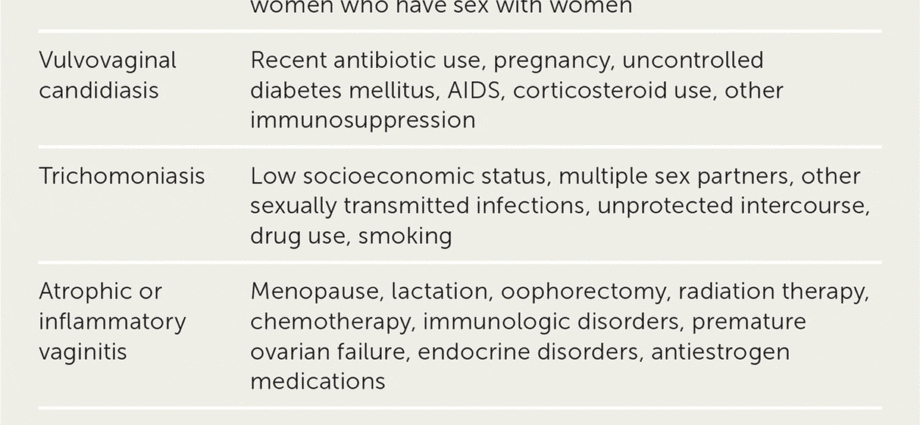Contents
Medical treatments for vaginitis – vaginal infection
It is essential to see a doctor if you think you have vaginitis in order to get a reliable diagnosis. Sometimes it is necessary to take vaginal swabs to find the cause of the infection and make sure it is not just vaginal dryness. It is also imperative to consult your doctor in the event of symptoms of vaginitis accompanied by fever or unusual symptoms (vomiting, abdominal pain, etc.), in the event of pregnancy, risk of sexually transmitted infection or multiple vaginal infections during last months. |
Conventional treatments treat 90% of vaginitis in less than 2 weeks – and sometimes in a few days – if the risk factors are low.
Yeast vaginitis. If symptoms are present, it is treated with vaginal eggs or antifungal creams to be applied into the vagina at bedtime, even during menstruation. Women who have previously been diagnosed with such vaginitis and are familiar with its symptoms can purchase these prescription or non-prescription drugs, asking the pharmacist for advice. For example, miconazole (Monistat®), clotrimazole (Canesten®) and tioconazole (Gynecure®), Clotrimazole® (mycohydralin), Sertaconasole (Monazol®)…
Medical treatments for vaginitis – vaginal infection: understand everything in 2 min
Oral treatments are also available by prescription, such as nystatin (Mycostatin®) and fluconazole (Diflucan®). Sometimes yeast infections are recurrent, so it’s important to look for the underlying cause and avoid risk factors. Note that yeast vaginitis is not a sexually transmitted infection. The sexual partner can however be treated, only if he has symptoms (in men, inflammation of the glans). When the infection is caused by a species of Candida rarer than Candida albicans (involved in 90% of cases), treatment withboric acid intra-vaginally is sometimes offered28.
Bacterial vaginosis. Tablets, gels or creams containing antibiotics are prescribed to treat bacterial vaginosis. The most commonly used drug is metronidazole, administered orally or vaginally. Clindamycin can also be used. Refrain from consuming alcohol during treatment with metronidazole and for 48 hours afterwards (alcohol may cause cramps, nausea and vomiting). If symptoms persist after treatment, it is necessary to consult a doctor again. No treatment is recommended for the male sexual partner. Treatment is imperative in the event of pregnancy even in the absence of symptoms.
Trichomonase. Trichomoniasis should be treated with a single dose of the drug metronidazole, obtained with a prescription from a doctor. For this type of vaginitis, it is important that all sexual partners are treated simultaneously to avoid recurrence regardless of the symptoms. Refrain from consuming alcohol during treatment with metronidazole and for 48 hours afterwards (alcohol may cause cramps, nausea and vomiting). Metronidazole should not be given during the first trimester of pregnancy. The doctor will then suggest clotrimazole as a cream or as an ovum (intravaginally). In addition, some experts recommend that breastfeeding women stop breastfeeding for 24 hours after taking their dose of metronidazole.
Remarks
– It is important to respect the dosage determined by the doctor, until the end of the treatment, even if the symptoms have disappeared.
– Notify your doctor if symptoms persist or reappear 2 weeks after treatment.
– Sexual relations should be avoided during treatment to avoid pain (and therefore subsequent sexual blockages), prevent reinfection and reduce attacks on the vaginal mucosa. Otherwise, have sex partners wear a condom as long as intercourse is not painful.
– Some oil-based creams weaken latex condoms. Check with your doctor.
– Notify your doctor in the event of a potential pregnancy.










